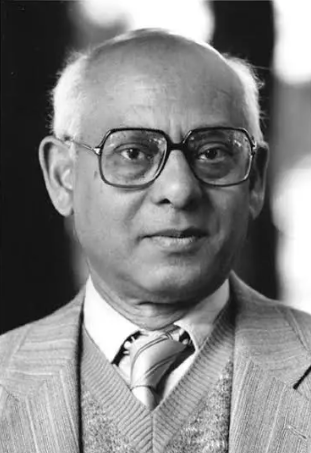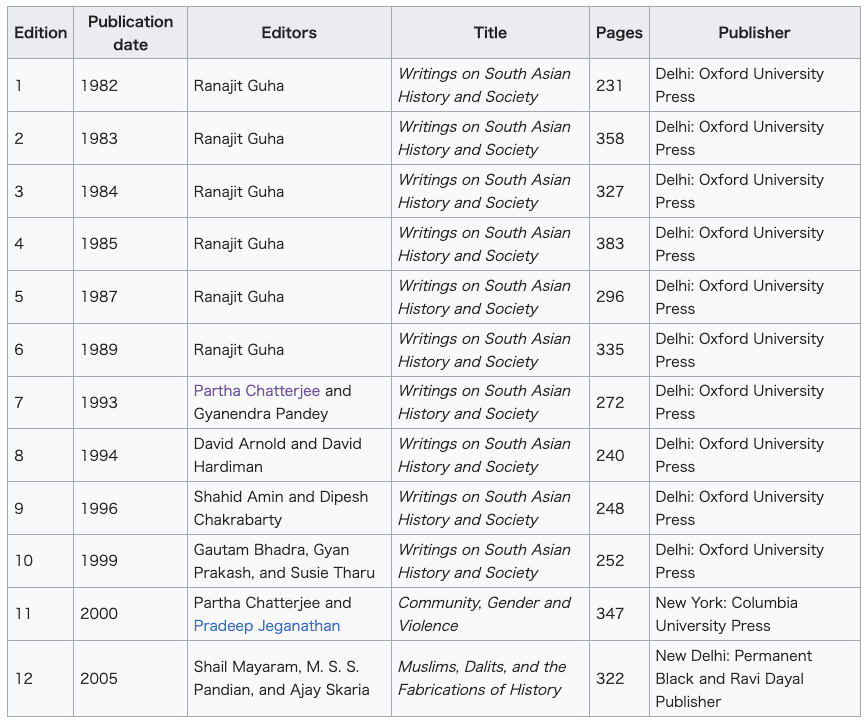
サバルタン・スタディーズ
Subaltern Studies
☆ サバルタン研究グループ (SSG)またはサバルタン研究集団は、ポストコロニアルおよびポスト帝国社会に関心を持つ南アジアの学者グループである。サバル タン研究という用語は、彼らの見解の多くを共有する他の人々にもより広く適用されることがあり、彼らはしばしば 「ポストコロニアル研究の典型」であり、その分野で最も影響力のある運動のひとつであると考えられている。 彼らの反本質主義的アプローチは、エリート層よりも社会の基層レベルにおける大衆の間に起こることに焦点を当てた、民衆史の一形態である(→「ラテンアメリカ・サバルタン研究」)。
Subaltern -
Three Minute Theory
| The
Subaltern Studies Group (SSG) or Subaltern Studies Collective is a
group of South Asian scholars interested in postcolonial and
post-imperial societies.[1] The term Subaltern Studies is sometimes
also applied more broadly to others who share many of their views and
they are often considered to be "exemplary of postcolonial studies" and
as one of the most influential movements in the field.[2] Their
anti-essentialist approach[3] is one of history from below, focused
more on what happens among the masses at the base levels of society
than among the elite. |
サ
バルタン研究グループ(SSG)またはサバルタン研究集団は、ポストコロニアルおよびポスト帝国社会に関心を持つ南アジアの学者グループである。[1]
サバルタン研究という用語は、彼らの見解の多くを共有する他の人々にもより広く適用されることがあり、彼らはしばしば
「ポストコロニアル研究の典型」であり、その分野で最も影響力のある運動のひとつであると考えられている。[2] 彼らの反本質主義的アプローチ[3]
は、エリート層よりも社会の基層レベルにおける大衆の間に起こることに焦点を当てた、民衆史の一形態である。 |
| The
term "subaltern" in this context is an allusion to the work of Italian
Marxist Antonio Gramsci (1891–1937). The term's semantic range has
evolved from its first usage by Ranajit Guha, following Gramsci, to
refer solely to peasants who had not been integrated into the
industrial capitalist system. It now refers to any person or group of
inferior rank or station, whether because of race, class, gender,
sexual orientation, ethnicity, or religion. The SSG arose in the 1980s, influenced by the scholarship of Eric Stokes and Ranajit Guha, to attempt to formulate a new narrative of the history of India and South Asia. The group started at the University of Sussex, then continued and traveled, mainly through Guha's students.[4] This narrative strategy was inspired by the writings of Gramsci was explicated in the writings of their mentor Ranajit Guha, most clearly in his "manifesto" in Subaltern Studies I and also in his classic monograph The Elementary Aspects of Peasant Insurgency. Although they are, in a sense, on the left, they are very critical of the traditional Marxist narrative of Indian history, in which semi-feudal India was colonized by the British, became politicized, and earned its independence. In particular, they are critical of the focus of this narrative on the political consciousness of elites, who in turn inspire the masses to resistance and rebellion against the British. Instead, they focus on non-elites, subalterns, as agents of political and social change. They have had a particular interest in the discourses and rhetoric of emerging political and social movements, as against only highly visible actions like demonstrations and uprisings. |
この文脈における「サ
バルタン」
という用語は、イタリアのマルクス主義者アントニオ・グラムシ(1891年~1937年)の研究を引用したものである。この用語の意味の範囲は、グラムシ
に倣ったラナジット・グーハによる最初の使用から、産業資本主義システムに組み込まれていない農民のみを指すものへと発展した。現在では、人種、階級、性
別、性的指向、民族、宗教など、あらゆる理由で劣った地位や階級に属する個人や集団を指す。 SSGは、エリック・ストークスとラナジット・グハの研究に影響を受け、インドと南アジアの歴史に関する新たな物語を構築しようとして、1980年代に誕 生した。このグループはサセックス大学で始まり、その後、主にグハの学生たちを中心に活動を継続し、各地を転々とした。[4] この語り口の戦略はグラムシの著作に触発されたもので、彼らの指導者ラナジット・グハの著作、特に『サバルタン研究 I』の「マニフェスト」や、代表作の単行本『農民蜂起の初歩的諸側面』で明確に説明されている。彼らはある意味では左派に属するが、インドの歴史を語る伝 統的なマルクス主義の物語を非常に批判的に捉えている。その物語では、半封建的なインドが英国に植民地化され、政治化され、独立を勝ち取ったとされる。特 に、この物語がエリートの政治的意識に焦点を当てていることを批判している。エリートは、英国に対する抵抗と反乱を大衆に促す。 その代わり、彼らは非エリート、サバルタンを政治的・社会的変革の担い手として注目している。彼らは、デモや暴動のような目に見える行動ではなく、台頭し つつある政治的・社会的運動の言説やレトリックに特に興味を持っている。 |
| Criticism One of the group's early contributors, Sumit Sarkar, later began to critique it. He entitled one of his essays "Decline of the Subaltern in Subaltern Studies", criticizing the turn to Foucauldian studies of power-knowledge that left behind many of the empiricist and Marxist efforts of the first two volumes of Subaltern Studies. He writes that the socialist inspiration behind the early volumes led to a greater impact in India itself, while the later volumes' focus on western discourse reified the subaltern-colonizer divide and then rose in prominence mainly in western academia.[5] Even Gayatri Spivak, one of the most prominent names associated with the movement, has called herself a critic of "metropolitan post-colonialism".[6] Indian sociologist Vivek Chibber has criticized the premise of Subaltern Studies for its obfuscation of class struggle and class formation in its analysis and accused it of excising class exploitation from the story of the oppression of the subaltern.[7] His critique, explained in his book Postcolonial Theory and the Specter of Capital, is focused on the works of two Indian scholars: Ranajit Guha and Dipesh Chakrabarty. According to Chibber, subaltern scholars tend to recreate the Orient as a place where cultural differences negate analyses based on Western experience. |
批判 このグループの初期の寄稿者の一人であるスミット・サーカーは、後に批判を始めた。彼は「サバルタン研究におけるサバルタンの衰退」と題した論文で、サバ ルタン研究の最初の2巻における経験論的およびマルクス主義的な取り組みの多くを置き去りにしたフーコー流の権力と知識の研究への転換を批判した。初期の 巻にみられた社会主義的なインスピレーションはインド国内でより大きな影響をもたらしたが、後期の巻で西洋の言説に焦点が当てられたことで、サバルタンと 植民地主義者の間の溝が明確化され、主に西洋の学術界で注目されるようになったと彼は書いている。[5] この運動と関連する最も著名な人物の一人であるガヤトリ・スピヴァクでさえ、自らを「大都市のポストコロニアリズム」の批評家と呼んでいる。[6] インドの社会学者ヴィヴェク・チッバーは、サバルタン研究の前提を批判し、その分析における階級闘争と階級形成の曖昧化を指摘し、サバルタンの抑圧の物語 から階級搾取を排除していると非難している。[7] 彼の批判は著書『ポストコロニアル理論と資本の亡霊』で説明されており、インドの2人の学者、ラナジット・グハとディペシュ・チャクラバーティの研究に焦 点を当てている。チバーによれば、サバルタン学派の学者たちは、西洋の経験に基づく分析を文化的な相違が否定する場所として、東洋を再創造する傾向があ る。 |
 |
 |
| Scholars associated with
Subaltern Studies include: David Arnold Gautam Bhadra Dipesh Chakrabarty Partha Chatterjee Ranajit Guha David Hardiman Sudipta Kaviraj Gyanendra Pandey Gyan Prakash Sarojini Sahoo Ajay Skaria Gayatri Chakravorty Spivak Susie Tharu |
サバルタン学派の研究者は以下の通りである。 デイヴィッド・アーノルド ゴータム・バドラ ディペッシュ・チャクラバーティ パルタ・チャタジー ラナジット・グーハ デイヴィッド・ハーディマン スディプタ・カヴィラジ ギャネンドラ・パンデー ギャーン・プラカーシュ サロジニ・サホー アジャイ・スカリア ガヤトリ・チャクラヴォルティ・スピヴァク スージー・タル |
| Latin
American subaltern studies Latino philosophy Orientalism Edward Said Howard Zinn |
ラテンアメリカ・サバルタン研究 ラテンアメリカ哲学 オリエンタリズム エドワード・サイード ハワード・ジン |
| https://en.wikipedia.org/wiki/Subaltern_Studies |
|
| References 1. "Subaltern Studies : The Encyclopedia of Postcolonial Studies : Blackwell Reference Online". Archived from the original on 2018-05-19. Retrieved 2018-05-18. 2. Connell, Raewyn (2005). Southern Theory. 3. Atabaki, Touraj (2003). Beyond Essentialism: Who Writes Whose Past in the Middle East and Central Asia? Inaugural lecture, 13 December 2002 (PDF). Archived (PDF) from the original on 22 August 2016. Retrieved 29 April 2013. 4. "Ranajit Guha and Subaltern Studies" (PDF). Archived (PDF) from the original on 2018-05-19. 5. Sumit Sarkar, "The Decline of the. Subaltern in Subaltern Studies" in his Writing Sggial History. Delhi, Oxford University Press, 1997. 6. Gayatri_Chakravorty_Spivak, A Critique of Postcolonialism, Harvard University Press 7. "How does the subaltern speak?". jacobinmag. Archived from the original on 2016-02-08. Retrieved 2016-01-21. 8. "Subaltern Studies: Bibliography of articles and reviews and listing of table of contents of the series of books". asianstudies.github.io. Archived from the original on 2018-12-01. Retrieved 2019-10-23. |
参考文献 1. 「サバルタン研究 : ポストコロニアル研究事典 : ブラックウェル・リファレンス・オンライン」. 2018年5月19日にオリジナルからアーカイブ. 2018年5月18日に閲覧. 2. コネル, レイウィン (2005). 『サザン・セオリー』. 3. アタバキ、トラージ(2003)。『本質主義を超えて:中東と中央アジアにおいて誰が誰の過去を書くのか?』。2002年12月13日就任講演(PDF)。2016年8月22日にオリジナルからアーカイブ(PDF)。2013年4月29日に取得。 4. 「ラナジット・グハとサバルタン研究」 (PDF). 2018年5月19日にオリジナルからアーカイブ (PDF)。 5. スミット・サルカール、「サバルタン研究におけるサバルターンの衰退」『サブアルターン史を書く』所収。デリー、オックスフォード大学出版局、1997年。 6. ガヤトリ・チャクラヴォルティ・スピヴァク『ポストコロニアル主義の批判』ハーバード大学出版局 7. 「サバルタンはどのように語るのか?」. jacobinmag. 2016年2月8日時点のオリジナルからアーカイブ. 2016年1月21日閲覧. 8. 「サバルタン研究:論文・書評の書誌目録及びシリーズ書籍の目次一覧」. asianstudies.github.io. 2018年12月1日時点のオリジナルからアーカイブ. 2019年10月23日に閲覧. |
| Further reading Young, Robert, White Mythologies. Routledge, 1990, reissued 2004. Several associated ISBNs, including ISBN 0-415-31181-0, ISBN 0-415-31180-2. Ludden, David, ed., Reading Subaltern Studies. Critical History, Contested Meaning and the Globalization of South Asia, London 2001. Chaturvedi, Vinayak, ed., Mapping Subaltern Studies and the Postcolonial. London and New York 2000. Cronin, Stephanie, ed., "Subalterns and Social Protest: History from Below in the Middle East and North Africa". Routledge, 2008. US & Canada. |
追加文献(さらに読む) ヤング、ロバート著『白人の神話学』ラウトリッジ社、1990年刊、2004年再版。関連ISBN番号:ISBN 0-415-31181-0、ISBN 0-415-31180-2など。 ラッデン、デイヴィッド編『サブアルタナティブ研究を読む』 批判的歴史、争われる意味、そして南アジアのグローバル化、ロンドン、2001年。 チャトゥルヴェディ、ヴィナヤク編、『サブアルターン研究とポストコロニアルの地図を描く』。ロンドンおよびニューヨーク、2000年。 クロニン、ステファニー編、『サブアルターンと社会抗議:中東および北アフリカにおける下からの歴史』。ラウトレッジ、2008年。米国およびカナダ。 |
リ ンク
文 献
そ の他の情報
Copyleft, CC, Mitzub'ixi Quq Chi'j, 1996-2099
☆
 ☆
☆